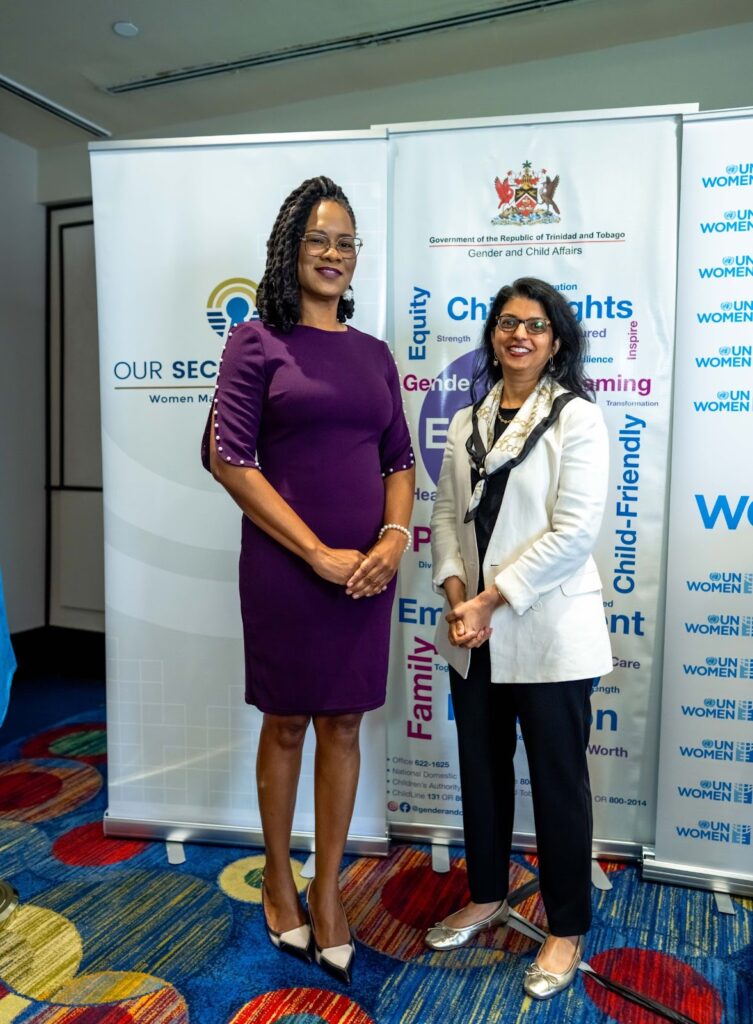Trinidad and Tobago has made history as the first Caribbean nation to officially launch a National Action Plan (NAP) on Women, Peace, and Security (WPS), marking a significant milestone in the region’s commitment to creating safer communities through inclusive peacebuilding efforts.
Preceding the launch was a multi-stakeholder two-day technical workshop held on March 24-25, 2025, in Port of Spain, Trinidad and Tobago, which brought together key government officials, civil society representatives, and international partners to finalize the operational framework for implementing the WPS NAP. Hosted by the Government of Trinidad and Tobago, in partnership with Our Secure Future and UN Women, the high-level workshop concentrated on implementation strategies, monitoring frameworks, and coordination mechanisms through interactive exercises and cross-sectoral discussions.
Advancing Women’s Participation in Peace and Security Challenges
The WPS NAP (2025-2030) provides a strategic framework to address organized crime and violence, harmful norms, gender-based violence (GBV), institutional strengthening, climate resilience, and data-based policy and decision-making, recognizing that security strategies must reflect the lived realities of all citizens. The WPS NAP aligns with international commitments such as UN Security Council Resolution 1325 and is built on a framework that integrates peace, security, and violence prevention into national development strategies.
Trinidad and Tobago’s plan acknowledges that while the country is not in an active conflict zone, it confronts high rates of gun and gang-related violence, which affect men, women, youth, and vulnerable communities in different ways. This distinctive focus on “non-peace” conditions separates this NAP from others globally, establishing it as a model for nations dealing with similar security challenges.
Permanent Secretary Kurt Meyer from the Office of the Prime Minister, speaking on behalf of the Honourable Ayanna Webster-Roy, Minister of State in the Office of the Prime Minister with responsibility for Gender and Child Affairs, stated: “Our country is not in an active conflict zone, but we continue to see high rates of armed violence, which results in killings, gang activity and Gender-based Violence and other forms of violence. This situation of non-peace affects women and girls disproportionately […] The National Action Plan serves as a vital tool to advance the WPS Agenda and support women’s full and meaningful participation in addressing peace and security challenges.”
Collaborative Efforts Driving Gender-Responsive Strategies
The WPS NAP builds on two years of extensive work led by Our Secure Future, UN Women, the Government of Canada, the Office of the Prime Minister – Gender and Child Affairs, the Ministry of National Security, and the WPS Multi-stakeholder Advisory Group.
At the launch event of the NAP, Minister Webster-Roy issued a direct call to action: “Our Government has embraced the strategy of treating crime and violence as public health issues, a perspective that demands intentional, informed, and compassionate interventions. Our approach is multi-faceted. Through the various Ministries’ training and other initiatives, we intend to equip our young people with sustainable means of livelihoods, and empower them to reject the lure of crime and embrace the dignity of honest work.”

The WPS NAP focuses on enhancing safety by preventing and responding to gun and gang violence, developing effective prevention strategies with gender-responsive methods, and increasing women’s leadership in crime prevention and security efforts.
In closing remarks at the NAP launch event, Ms. Je’nille Maraj, UN Women Multi-Country Office – Caribbean Planning and Coordination Specialist, congratulated all stakeholders on their invaluable work on the WPS NAP. She also expressed her hope that other countries will join in advancing the WPS Agenda, emphasizing that the strength of the WPS Agenda as compared to traditional approaches is the integration of a gender perspective into all aspects of peace and security, contributing to a more just, equitable, and sustainable peace.
Research has demonstrated that when women participate in peace processes, the resulting agreements are 35% more likely to last at least 15 years, highlighting the importance of women’s inclusion in security discussions.
Leading the Way in Citizen Security with Gender-Informed Strategies
Trinidad and Tobago’s leadership has already begun to influence regional discussions. On March 27, 2025, an experts’ meeting hosted by the British High Commission in partnership with Our Secure Future and UN Women was held in Georgetown, Guyana, bringing together stakeholders from Guyana, Trinidad and Tobago, and Barbados to advance similar initiatives across the Caribbean. The convening focused on next steps toward facilitating the implementation of a Regional WPS Approach in the Caribbean and National Action Plans for each country.
During this meeting, Sahana Dharmapuri, Vice President of Our Secure Future, emphasized the importance of regional collaboration: “We want to do things regionally because it goes back to the principle that if we work together, we can accomplish great things. The discussion today is building on that—fostering regional sharing, ideas, and coordination—which is unique […] Capturing what women are saying about peace and security in their countries and sharing it with the global community highlights its global importance.”
Emphasis was also placed on inclusive dialogue aimed at pinpointing opportunities to strengthen security responses and support the sustainable and effective implementation of Trinidad and Tobago’s NAP. By adopting gender-transformative strategies and public health perspectives, the plan moves beyond traditional security measures, offering a prevention-focused solution to gun and gang violence. Trinidad and Tobago’s WPS NAP sets a positive precedent for the Caribbean, demonstrating how the WPS agenda can be applied to safety and non-traditional security challenges.

